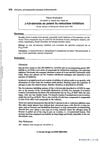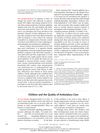 11 citations,
January 2013 in “Postępy Dermatologii i Alergologii”
11 citations,
January 2013 in “Postępy Dermatologii i Alergologii” The conclusion is that a combination of noninvasive treatments and lifestyle changes can improve skin health during menopause.
 April 1992 in “Current opinion in therapeutic patents”
April 1992 in “Current opinion in therapeutic patents” New steroids were patented as effective for treating acne, hair loss, and other conditions related to hormones.
 January 2024 in “Women's health science journal”
January 2024 in “Women's health science journal” Hormonal imbalances are a key cause of missed menstrual periods in women.
 30 citations,
December 2001 in “Journal of The European Academy of Dermatology and Venereology”
30 citations,
December 2001 in “Journal of The European Academy of Dermatology and Venereology” Hormonal therapy is a good option for women with severe acne, especially when there's a chance of hormone imbalance.
 9 citations,
January 2014 in “Annals of Dermatology”
9 citations,
January 2014 in “Annals of Dermatology” Some breast cancer patients on hormonal therapy may develop male or female pattern hair loss, which can sometimes be improved with topical treatments.
 63 citations,
January 2012 in “The European Journal of Contraception & Reproductive Health Care”
63 citations,
January 2012 in “The European Journal of Contraception & Reproductive Health Care” Some birth control pills have a higher risk of blood clots than others.
 32 citations,
May 2006 in “The Journal of Urology”
32 citations,
May 2006 in “The Journal of Urology” Using finasteride with TIP extends time off period for prostate cancer patients.
 19 citations,
August 2014 in “Journal of Ethnopharmacology”
19 citations,
August 2014 in “Journal of Ethnopharmacology” The study created a test that found hormonal and toxic effects in plant and fungal extracts using prostate cancer cells.
 March 2024 in “Revista Ciências da Saúde CEUMA”
March 2024 in “Revista Ciências da Saúde CEUMA” Testosterone increases sexual behavior in female capuchin monkeys.
 July 2020 in “Environmental Science and Pollution Research”
July 2020 in “Environmental Science and Pollution Research” Finasteride harms invertebrates' survival and burial ability.
 2 citations,
January 2018 in “Elsevier eBooks”
2 citations,
January 2018 in “Elsevier eBooks” Lipid nanoparticles improve drug delivery through the skin, offering stability, controlled release, and better compatibility with skin.
 26 citations,
April 2019 in “Journal of Cosmetic Dermatology”
26 citations,
April 2019 in “Journal of Cosmetic Dermatology” Herbal alternatives like saw palmetto and green tea may offer safe, effective treatment for hormonal hair loss.
 24 citations,
January 2013 in “Indian Journal of Dermatology, Venereology and Leprology”
24 citations,
January 2013 in “Indian Journal of Dermatology, Venereology and Leprology” Hormonal treatment is effective for women with acne not helped by usual treatments, especially if they have hormonal imbalances.
 21 citations,
July 2014 in “Clinics in Dermatology”
21 citations,
July 2014 in “Clinics in Dermatology” Hormonal contraceptives can help treat acne by affecting sebum production and androgen levels.
 17 citations,
November 2000 in “Journal of the American Pharmaceutical Association”
17 citations,
November 2000 in “Journal of the American Pharmaceutical Association” The document concludes that low-dose oral contraceptives and hormonal therapies can manage perimenopause symptoms and reduce some health risks, but lifestyle changes and disease screening are also important.
 14 citations,
January 2008 in “Dermatology Online Journal”
14 citations,
January 2008 in “Dermatology Online Journal” Hormonal therapies like cyproterone acetate and spironolactone may help some women with hair loss, but finasteride 1mg is not useful, and the effectiveness of other treatments is still unclear.
 2 citations,
March 2004 in “Reviews in Gynaecological Practice”
2 citations,
March 2004 in “Reviews in Gynaecological Practice” Hormonal changes and psychological issues can cause sexual dysfunction in postmenopausal women. Behavioral therapy is recommended first, with hormone replacement helping some symptoms but not libido. Testosterone can improve libido, but its effects on overall sexual function are unclear. Emotional and relationship issues should be addressed before using medication, and the benefits and risks of testosterone supplementation should be considered.
 September 2018 in “Journal of the American Academy of Dermatology”
September 2018 in “Journal of the American Academy of Dermatology” Elderly patients with CCCA were all African American with low vitamin D, but no iron or zinc deficiencies, and no hormonal imbalances compared to younger patients.
 January 2008 in “The New England Journal of Medicine”
January 2008 in “The New England Journal of Medicine” Children receive less than half of recommended health care, and routine hormonal testing for female-pattern hair loss is unnecessary without other androgen excess symptoms.
 January 2008 in “Dermatology Online Journal”
January 2008 in “Dermatology Online Journal” Hormonal therapy like cyproterone acetate and spironolactone may help female hair loss, but more research is needed, especially for pre-menopausal women.
 2 citations,
July 2008 in “Paediatrics & child health”
2 citations,
July 2008 in “Paediatrics & child health” Severe acne in a young girl may indicate underlying hormonal issues.
 38 citations,
July 2012 in “international journal of endocrinology and metabolism”
38 citations,
July 2012 in “international journal of endocrinology and metabolism” Some plant-derived compounds may help with hormonal conditions, but more research is needed to confirm their effectiveness.
 1 citations,
September 2020 in “Journal of the Endocrine Society”
1 citations,
September 2020 in “Journal of the Endocrine Society” Men have worse COVID-19 outcomes than women due to genetic and hormonal differences.
 April 2016 in “Journal of The American Academy of Dermatology”
April 2016 in “Journal of The American Academy of Dermatology” Women with PCOS often have more hair growth, skin darkening, and acne, which are linked to hormonal and metabolic issues.
 6 citations,
January 2017 in “British Journal of Dermatology”
6 citations,
January 2017 in “British Journal of Dermatology” Frontal fibrosing alopecia is a scarring hair loss condition mainly affecting older women, with no known cause and treatments that may help stabilize hair loss.
 14 citations,
January 2017 in “Elsevier eBooks”
14 citations,
January 2017 in “Elsevier eBooks” CBG may help with various medical conditions but needs more human research to confirm safety and effectiveness.
 10 citations,
January 2017 in “Expert Opinion on Pharmacotherapy”
10 citations,
January 2017 in “Expert Opinion on Pharmacotherapy” The conclusion is that more research is needed to better understand and treat adult acne, and that patient education and simple treatment plans are important for better results.
 May 2019 in “The Journal of Sexual Medicine”
May 2019 in “The Journal of Sexual Medicine” Flibanserin's effectiveness for low sexual desire in premenopausal women may vary based on hormone levels, with normal hormone levels showing better responses.
 90 citations,
May 2019 in “Drugs”
90 citations,
May 2019 in “Drugs” Long-term use of azole antifungals can cause hair loss, hormonal imbalances, and severe skin reactions.
 90 citations,
December 2007 in “Current Oncology”
90 citations,
December 2007 in “Current Oncology” Non-hormonal treatments should be used first for sexual dysfunction in postmenopausal breast cancer patients on aromatase inhibitors, with hormones as a second option.






























